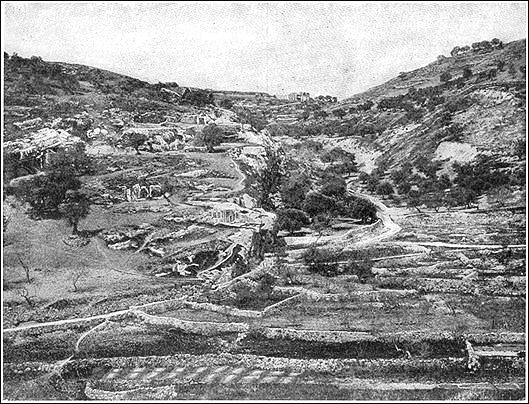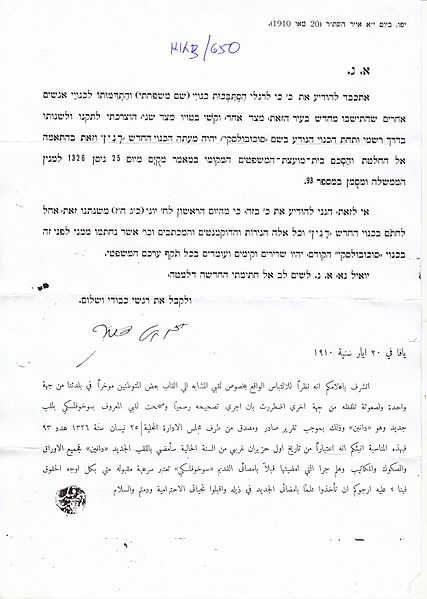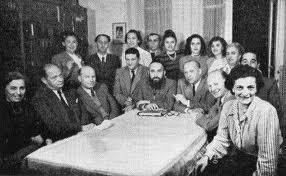
Today I’m wrapping up the tale of the two Doktors Kornmehl, Ezriel and Viktor, the dual subjects of this family history writing challenge, with kudos — and a mild kvetch. It’s one thing to find out that your relatives’ surnames were changed through transcription errors in records, illiteracy, etc. It’s quite another to discover that they made the changes on purpose — and en masse.
Koren, Carmel and… ?

Perhaps this is something I should have known as a Jewish person who is reasonably literate and aware of public events but somehow the practice of European Jews changing their surnames to sound more Hebrew when they went to Palestine eluded me. When a conversation with Hillel Koren, Viktor’s son, tipped me off that it had become popular, I poked around and sure enough, there was an article in Wikipedia about the Hebraization of European Jewish surnames.
I won’t go into great detail here because I have another story, about finding Ezriel’s family, to tell. I just want to put it on record that, although I very much understand the impulse of my ancestors to put the past behind them and deeply sympathize, I think they were being a little short sighted.
Couldn’t they have anticipated that name changes would mess with the heads of future family historians who were trying to find them, especially newbies like me?
And couldn’t they at least have coordinated and chosen one name to change to per family?
Consider the cases of Viktor and Bertschi Kornmehl.
Viktor changed his family name to Koren. His brother, Bertschi, changed his family name to Carmel. This information was not difficult to unearth because, happily, Hillel Koren, Viktor’s son, was considerate enough to keep in touch with Kornmehl relatives.
Things were not so simple when it came to Ezriel Kornmehl, however.
Ezriel, again
It’s been a long time, so let me refresh your memory. I left Ezriel on Day 9 of the Family History Writing Challenge after having identified his father; traced his military service; and found out who he married (Ernestyna Karp). According to History of the Jews of Jaslo:
[Ezriel] escaped to Russia with his family prior to the German arrival. He survived the war years in Russia and returned to Poland following WWII where he settled in Wroclaw and began to practice. He suddenly died of a heart attack while still very active. His wife and only son left Poland and reached Israel three years ago. The son finished in Israel medical school and works at Hadassah Hospital in Jerusalem. [Note: The history was published in 1953, so “three years ago” would have been around 1950]

And that’s where the trail went cold. What happened to the wife and the son who finished medical school and worked at Hadassah Hospital? Jill Leibman Kornmehl contacted the hospital but they had no record of any Kornmehls. We were getting frustrated. I was even planning to go on a people-finder Israeli radio show that, with the time difference, would have had me trying to be coherent about the relatives whose trail had been lost at around midnight.
Then, happily, my friend Lydia found Ezriel’s mother, Chana Dwora Kornmehl, via a Yad Vashem testimony of her daughter-in-law, who signed herself A. Kornel. Where the A. came from for someone named Ernestyna is another question entirely. The point here is that suddenly there was a name to look for: Kornel.
Sure enough, googling the name “Ezriel Kornel” led to a neurosurgeon of that name who wrote on a blog* that he had a father named Ludwig, as well as a brother named Amiel (whose position I can’t sum up in one word, but who is extremely successful in semiconductors). Further research on Ludwig Kornel turned up an endocrinologist (diabetes/hormone specialist) in Chicago who had graduated from medical school in Wroclaw, Poland — where the original Ezriel had died.
*This should put the final bullet in the notion that blogging is only for people who sit in basements in their pajamas. Okay, I’m still wearing my PJs, but houses in Tucson don’t have basements.
Kornels and Farewells
No one has spoken at length with members of the Kornel family yet and their ties to — or awareness of — the rest of the Kornmehl clan, so I’ll leave them here. I hope that at some point I can write more about them.
In summation, then:
Dr. Viktor Kornmehl escaped from Vienna to Palestine, changed his name to Koren, practiced medicine, was the co-founder of a health insurance company, and had a very successful son, Hillel.
Dr. Ezriel Kornmehl survived the war and died of natural causes in his native Poland, but his wife, Ernestyna, and doctor son, Ludwig, went to Israel where they changed their name to Kornel. Ludwig Kornel has two very successful sons, Amiel and Ezriel. Note: There is a tradition in Judaism of naming children after deceased relatives. In this case, Ezriel Kornel is named for his grandfather — who had a different surname.
And on this, the 27th Day of the Family History Writing Challenge, I bid a fond farewell to the Doktors Kornmehl. The picture next to the title, from Wikimedia Commons, is of Gehenna or Jewish hell; oddly, it is an actual place called the Valley of Hinnom in Israel. I was only in genealogy Gehenna very briefly, but couldn’t resist the title — or the picture.

I appreciate the personal touch you brought to the frustration of tracking descendants who changed their names. I know a few couples who, rather than hyphenate their names, have created new ones. A “Martin” married a “Deal” and they both became Marteals.
I always tell them they’re going to freak out future genealogists. I think I’ll send them your post to suggest they at least keep good records for future generations.
I hadn’t even thought about that. I know a few couples who have done that too, including one who just took a name that was totally different from both of theirs.
Yes, do send along my post. Perhaps it will do some good. Of course the future is in genetic DNA. No hiding from that with changed names!
That article on Hebraization of surnames is actually quite tame in its description of Ben Gurion’s desire for Hebrew surnames. It was well know that for anyone to have any position in the government they had to have a Hebraized name – it was not a suggestion as the article implies.
One example is this story of a military pilot who had to change his name because in 1960 he was going abroad (to Ghana) to train pilots and Ben Gurion had ordered that ‘Anyone who represents Israel abroad must have a Hebrew last name’:
http://books.google.co.il/books?id=mgHpo3yxELsC&pg=PA229&lpg=PA229&dq=ben+gurion+pilot+hebrew+name&source=bl&ots=KDrbBJv-4F&sig=EDWdC7M9ly_5e8GC3wsJE8a_dnw&hl=en&sa=X&ei=cHwuUcOcCu2S0QW26YGYCw&redir_esc=y#v=onepage&q=ben%20gurion%20pilot%20hebrew%20name&f=false
An interesting name change I came across in my research was the change from Traurig to Al-Yagon. My family’s last name was Traurig about 150 years ago, although not all Traurigs are related to me. In my research I came across a Traurig family in Israel that changed their name to Al-Yagon. Traurig in German is Sad. Al Yagon in Hebrew is Without Sorrow. It seems one of this family became a famous judge in Israel.
Speaking of which there are two useful databases on the IGS site for searching these name changes. They are:
Name Changes in the Palestine Gazette 1921-1948 (English and Hebrew)
http://www.isragen.org.il/siteFiles/1/153/4971.asp
Name Changes 1948-1979 (Hebrew only)
http://www.isragen.org.il/siteFiles/1/618/7927.asp
I would just add that the first database (which was transcribed by volunteers from microfilmed lists of names) didn’t find a name I had previously found on there (several years ago), so it seems something is wrong with it. The second database is new to me, and it is a fully automated OCR database which makes you download a PDF of the files it find hits in, which is a bit awkward. It’s also only available in Hebrew, but for those not able to type in Hebrew, or who even know the proper spelling in Hebrew of a name, they can use Steve Morse’s English to Hebrew Transliteration tool:
http://stevemorse.org/hebrew/eng2heb.html
I would just suggest trying all three spellings (Sephardic, Ashkenazic, and Yiddish) when searching.
Thank you very much for adding your vast store of knowledge to what was, clearly, a superficial article. How interesting about Ben-Gurion and how funny about the family that turned from Sad to Sorrowless. I wonder if that was a political comment, wishful thinking…
These are great resources. Thanks again for sharing — and explaining.
Too bad February is a short month…who knows what else will turn up?? It has been fun and interesting discovering the lives of the Doktors Kornmehl. What fascinating charachters and what a great job you did meeting the family history writing challenge!!!
If there was one more day in February you would have had to scrape me off the floor! The blogging and the research are far from over — they just won’t be as intensive as they were.
Thank you for your kind words — and your support. I literally couldn’t have done this without your help.
I’m going to miss the daily posts now! I am glad to know about Gehenna where I must go spend quite a bit of time, nice to know I am going to be meeting Jews there.
Earlier this month I did a rather lengthy news feature on this social detox center (a bit of a summary is posted below) – and am still exhausted from it – and kind of fed up with news. I long for fantasy. How you managed to do this daily log into the past, which was quite fascinating and detailed, and a major other project – well, good on you!
Thanks, Diane. It was exhausting and it was very odd to wake up this morning and know I didn’t have to write a new post (though, happily, I’m not without a bit of work). But I’m sure I’ll have one up by Monday again. I’m not going to stop researching and blogging does provide accountability and focus.
I’ll go check out your article — which also sounds exhausting and not nearly as satisfying as finding lost relatives.